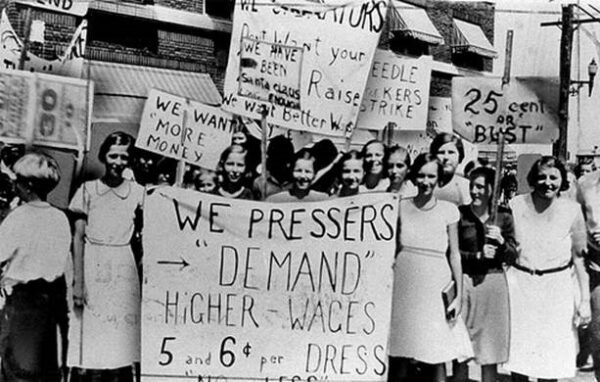Archive for the ‘Wage information’ Category

EQUAL PAY FOR WOMEN
San Francisco Bars Employers Asking Applicants for Pay History Taking a cue from the California Equal Pay Act (2016), San Francisco’s Board of Supervisors has passed a city-wide “Parity in Pay Ordinance” promoting gender wage equality by restrictions on what an employer can ask a job applicant on his/her pay history. Effective July 1, 2018, […]

CAUTIONARY TALES EPISODE 1
A Minimum Wage and Overtime Recovery For Three Times Amount Claimed California was among the first states to require a minimum hourly wage, 16 cents in 1916. Federal law finally joined the trend in 1938. Now, cities and counties are enacting ordinances for ever-higher minimums. See, The History of Minimum Wage Laws, and Location, Location, Location…Location […]

LOCATION, LOCATION, LOCATION … LOCATION
California Municipal Minimum Wage Rates Continue to Grow California hourly minimum wage is currently $10.50 for employers with 26 or more on payroll and $10.00 for employers with 25 or less and on January 1, 2018, the rates increase to $11.00 and $10.50 respectively. The state minimum wage will continue to increase each year until […]

NEW NOTICE POSTING REQUIREMENTS FOR BARBERS AND COSMETOLOGISTS
CUTTING TO THE CHASE – New Workplace Posting Requirements for California’s Salon Industries, Effective July 1, 2017 Starting July 1, 2017, California’s Board of Barbering and Cosmetology (BBC) requires its licensees – including hair salons, nail salons, estheticians, and barbers — to post a special Labor Commissioner notice on applicable employment laws. The notice includes information […]

MID-YEAR DEADLINE APPROACHES
California Employers Must Post Certain Updated Workplace Notices by July 1, 2017 All California employers must prominently post certain notices on wages, hours and working conditions. Employers must display these announcements where all employees have access. Failing to inform employees of their rights can subject an employer to penalties. Several California statewide and local notices must […]

MINIMUM WAGE IN CALIFORNIA
Published Industry Wage Orders Now Reflect Current and Upcoming State Minimum Wage Increases – Have You Posted the Correct Wage Order? The California Industrial Welfare Commission’s (IWC) 18 published “wage orders” can be among the most underutilized items in an HR Manager’s toolkit. They are chock full of wage and hour regulations regarding overtime wages, meal […]

LOCATION, LOCATION, LOCATION
Nine California Municipalities are Increasing Minimum Wage on July 1, 2017 As relayed in our December, 2016 blog Hot Off the Presses, no less than 23 local governments are now requiring minimum wage levels higher than the California standard. Nine municipalities are raising their rates effective July 1, 2017, with larger Emeryville employers the hardest hit. […]

A SUPER-SIZED MCDONALD’S OVERTIME CLASS ACTION RULING
Company Loses by Management Inattention to California Compliant Pay Policies and Practices A Los Angeles superior court judge has ruled McDonald’s in violation of California’s daily overtime laws in 119 restaurants. Maria Sanchez v. McDonald’s Restaurants of California, Inc., L.A. County Superior Court No. BC499888, April 20, 2017 order. The decision is a lesson in […]

GOVERNMENTAL MICROMANAGEMENT IN SAN JOSE
New “Opportunity to Work” Ordinance Effective March 13, 2017, the City of San Jose’s Opportunity to Work Ordinance requires employers with 36 or more employees to offer additional work hours to existing, qualified part-time employees before hiring new employees, including subcontractors and use of temporary staffing services. The ordinance does not cover employees that are […]

WHAT’S NEW IN 2017
Employers Must Notify All California Workers if Income Tax Credit Congress created the Federal Earned Income Tax Credit (EITC) in 1975 to incentivize low-income workers to seek employment rather than welfare. In 2015, California authorized the “Cal EITC” for the same purposes. The federal and California EITC programs each reduce the amount of tax that […]
